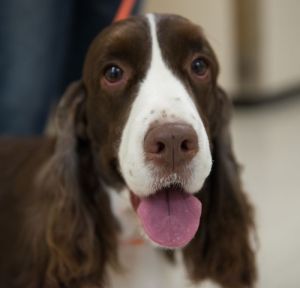In veterinary medicine, vaccination is the No. 1 defense against some very nasty – and often fatal – diseases in pets, including rabies and distemper in dogs and panleukopenia in cats.
 Vaccination is so important to pet health that we consider it a cornerstone of preventive care.
Vaccination is so important to pet health that we consider it a cornerstone of preventive care.
Even so, some pet owners are cautious about vaccine administration. For instance, cat owners might know that, in some uncommon cases, cats have developed cancerous tumors at vaccine injection sites. Dog owners might have heard speculation about a connection between vaccines and a form of canine anemia.
The risk of administering the vaccine, very low in most cases, should be considered along with the risk of getting, treating or surviving the disease. Overall, protective benefits far outweigh vaccine risks because vaccines stimulate immune responses, allowing your pet to fight future infections or preventing infection entirely.
Here are some questions to address with your veterinarian and to answer with his or her guidance: Should my pet be vaccinated? What diseases should my pet be vaccinated against? How often should my pet receive vaccines?
Additional issues to consider and discuss with your veterinarian are:
- Is my pet healthy enough to be vaccinated?
- Where does my pet travel?
- What is a typical day for my pet?
Vaccination guidelines for pets
Vaccine guidelines, based on the most current scientific literature, have been developed for dogs by the American Animal Hospital Association and for cats by the Association of Feline Practitioners.
In these guidelines, vaccines are described as core or non-core. Core vaccines are those every pet should get because the disease is highly infectious, hard to treat, and is fatal or dangerous to people.
For dogs, core vaccines protect against distemper, parvovirus and adenovirus. For cats, core vaccines protect against herpesvirus, calicivirus and panleukopenia. Rabies is a core vaccine in any area where rabies exists and is critical for keeping animals and people safe.
Non-core vaccines
Non-core vaccines are given based on the pet’s risk of getting the disease and the safety of the vaccine. Location, lifestyle, age and travel may play a role in determining if a non-core vaccine is given to your pet. For example, young dogs and those going to daycare or boarding regularly should consider Bordetella vaccine to protect against kennel cough.
For dogs sharing space with wildlife, vaccination against leptospirosis is recommended; tick preventives and vaccination are critical if your dog travels to areas with Lyme disease.
 Young cats are at greater risk for getting sick from feline leukemia virus (FeLV) and should be vaccinated at least as kittens. Vaccination against feline immunodeficiency virus (FIV) may be indicated for cats living in close quarters with infected cats.
Young cats are at greater risk for getting sick from feline leukemia virus (FeLV) and should be vaccinated at least as kittens. Vaccination against feline immunodeficiency virus (FIV) may be indicated for cats living in close quarters with infected cats.
Vaccines are designed to jump-start the immune system, so some mild reactions are expected. Within the first 48 hours after vaccination, your pet may be tired or not want to eat. There may be some soreness or swelling at the place the vaccine was given. These are normal and expected.
More concerning reactions that require immediate veterinary care are vomiting, swelling of the face, hives, difficulty breathing or a lack of response to your call.
It is important to remember that the risks of vaccination can be decreased with good medical care and proper handling of the vaccines. Although some states allow vaccine purchase and injection without veterinary supervision, there are no guarantees that the source or storage of these vaccines is safe and that the vaccines are effective.
A good physical exam performed by a skilled veterinarian can uncover issues that you may not have noticed and pets with any type of disease or wounds should not be vaccinated without medical care. If you choose a non-traditional source for vaccines, please make sure that you have veterinary services available in case of problems.
While vaccination is a cornerstone for preventive care, your veterinary team can help minimize the risks and provide other recommendations to keep your pet as healthy as possible.
Dr. Rebecca Ruch-Gallie is a veterinarian and clinical coordinator for the Community Practice service at Colorado State University’s James L. Voss Veterinary Teaching Hospital. Community Practice provides general care, wellness services, and treatment of minor injuries and illnesses for pets.